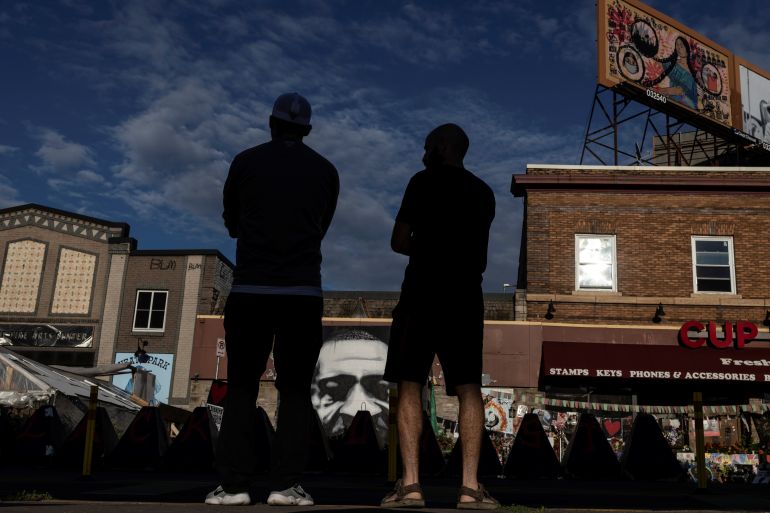US Justice Dept adopts changes to police department monitoring
Garland tells police chiefs association DOJ will work smarter as it seeks reforms of racial patterns, use of force.

United States Attorney General Merrick Garland, the US’s top law enforcement official, said on Monday the Department of Justice would improve its oversight of local police departments following criticism and pushback from police leaders.
In a speech to an online conference of the International Association of Chiefs of Police, a group of about 16,000 senior and mid-level police leaders from the US and other nations, Garland acknowledged it is “no secret” that the Department of Justice monitoring of troubled police departments has led to frustrations.
Keep reading
list of 4 items‘Qualified immunity’: How US police are shielded from lawsuits
How many people have been killed by US police since George Floyd?
Five US police officers charged over violent arrests of Black men
Garland announced he had accepted a recommendation for 19 steps the DOJ can take to improve its oversight and monitoring of local departments that have reached agreements with the DOJ to reform their racial patterns and use of force practices.
The new US rules come as police departments across the US are continuing to struggle following the Black Lives Matter protests that rocked the country in 2020. The DOJ is pursuing investigations of police departments in Minneapolis, Minnesota, Louisville, Kentucky and Phoenix, Arizona after several high-profile killings by police officers.
Last week, the head of Louisiana’s state police said he would welcome a “pattern and practice” investigation by the DOJ after an investigation by The Associated Press showed 67 percent of the of the Louisiana state police’s use of force was directed against Black people.
The AP uncovered a dozen cases during the past decade in which Louisiana state police troopers or their bosses ignored or concealed evidence of beatings, deflected blame and impeded efforts to root out misconduct.

“If the community is concerned about that, obviously I am concerned about that,” Colonel Lamar Davis told the AP.
“I’m a Black male. I don’t want to feel like I’m going to be stopped and thrown across a car just because of that, and I don’t want anyone else to feel that way.”
The DOJ conducted 50 listening sessions with police departments, mayors and others before adopting the new recommendations outlined in a memo by Associate Attorney General Vanita Gupta.
Police officials had told DOJ officials that while federal oversight is useful in improving police practices, they were concerned about high costs and a lack of oversight of the officials conducting the monitoring.
“While consent decrees and monitorships are important tools to increase transparency and accountability – the department can and should do more to improve their efficiency and efficacy,” Garland said in prepared remarks.
Monitors are typically hired to oversee consent decrees after negotiations between the DOJ and local police authorities and approval by a federal court. They are meant to serve as neutral arbiters of compliance with the consent decree’s terms.
In Minneapolis, meanwhile, where former officer Derek Chauvin was sentenced to 22.5 years in prison for the death of George Floyd in May 2020, police have been backing off of arrests, according to the Reuters news service.
Almost immediately after Floyd’s death, Reuters found, police officers all but stopped making traffic stops and approached fewer people they considered suspicious for fear an encounter could become another flashpoint.
“There isn’t a huge appetite for aggressive police work out there, and the risk-reward; certainly we’re there and we’re sworn to protect and serve, but you also have to protect yourself and your family,” said Scott Gerlicher, a Minneapolis police commander who retired this year.
The new DOJ rules on oversight will only apply to future consent decrees.
Annual budget caps will be imposed on monitors to prevent them from running up taxpayer costs for their services. Monitors will be subjected to term limits and required them to undergo performance assessment after several years to ensure they are effective.
After five years pass, cities and other local jurisdictions under a consent decree will be permitted to petition the court to move for termination of the monitorship by demonstrating compliance with the settlement’s terms.
In addition, the rules will bar monitors from “double-dipping” by serving on more than one monitoring team at a time.